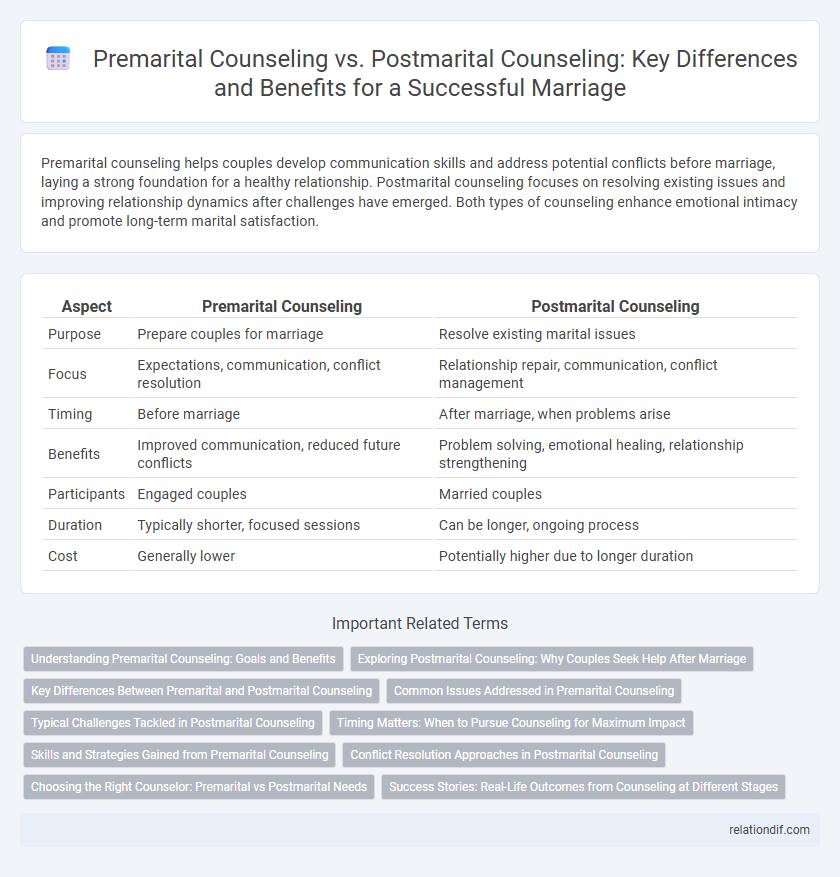Premarital counseling helps couples develop communication skills and address potential conflicts before marriage, laying a strong foundation for a healthy relationship. Postmarital counseling focuses on resolving existing issues and improving relationship dynamics after challenges have emerged. Both types of counseling enhance emotional intimacy and promote long-term marital satisfaction.
Table of Comparison
| Aspect | Premarital Counseling | Postmarital Counseling |
|---|---|---|
| Purpose | Prepare couples for marriage | Resolve existing marital issues |
| Focus | Expectations, communication, conflict resolution | Relationship repair, communication, conflict management |
| Timing | Before marriage | After marriage, when problems arise |
| Benefits | Improved communication, reduced future conflicts | Problem solving, emotional healing, relationship strengthening |
| Participants | Engaged couples | Married couples |
| Duration | Typically shorter, focused sessions | Can be longer, ongoing process |
| Cost | Generally lower | Potentially higher due to longer duration |
Understanding Premarital Counseling: Goals and Benefits
Premarital counseling aims to equip couples with communication skills, conflict resolution techniques, and shared expectations before marriage, reducing the risk of future misunderstandings and marital dissatisfaction. By addressing key topics such as financial planning, intimacy, and family dynamics, premarital counseling fosters a strong foundation for long-term relationship success. Research indicates couples who participate in premarital counseling report higher marital satisfaction and lower divorce rates compared to those who seek counseling only postmarriage.
Exploring Postmarital Counseling: Why Couples Seek Help After Marriage
Postmarital counseling addresses evolving challenges couples face after marriage, including communication breakdowns, financial stress, and intimacy issues. Couples often seek therapy to rebuild trust, resolve conflicts, and strengthen emotional connection during critical life transitions such as parenthood or career changes. This form of counseling provides tailored strategies to improve relationship dynamics and enhance long-term marital satisfaction.
Key Differences Between Premarital and Postmarital Counseling
Premarital counseling primarily focuses on building communication skills, setting realistic expectations, and addressing potential conflicts before marriage, helping couples establish a strong foundation. Postmarital counseling, on the other hand, deals with resolving existing issues, repairing damaged relationships, and improving emotional intimacy after marriage challenges arise. The key difference lies in prevention versus intervention, with premarital counseling aimed at avoiding problems and postmarital counseling targeting reconciliation and healing.
Common Issues Addressed in Premarital Counseling
Premarital counseling primarily addresses crucial issues such as communication skills, financial management, conflict resolution, and expectations about roles and responsibilities within the marriage. Couples explore topics like parenting styles, intimacy, and values alignment to build a strong foundation before tying the knot. Addressing these potential challenges early increases the likelihood of a healthy, enduring marriage.
Typical Challenges Tackled in Postmarital Counseling
Postmarital counseling typically addresses challenges such as communication breakdown, trust issues, and conflicts related to parenting and finances. Couples often seek guidance on resolving ongoing disagreements, managing emotional disconnection, and rebuilding intimacy after periods of distress. This type of counseling is crucial for navigating transitions, healing from betrayals, and improving long-term relational dynamics.
Timing Matters: When to Pursue Counseling for Maximum Impact
Premarital counseling offers couples essential tools to build strong communication, address expectations, and identify potential conflicts before marriage, leading to higher relationship satisfaction. Postmarital counseling becomes crucial when unresolved issues, stress, or communication breakdowns threaten marital stability, providing strategies to repair and strengthen the relationship. Choosing the right timing for counseling maximizes its effectiveness by either preventing problems or resolving them before they escalate.
Skills and Strategies Gained from Premarital Counseling
Premarital counseling equips couples with communication techniques, conflict resolution skills, and goal-setting strategies essential for a strong marital foundation. Learning to navigate financial planning, intimacy expectations, and family dynamics before marriage helps prevent common future disputes. These proactive skills reduce the need for postmarital counseling by fostering mutual understanding and emotional resilience early on.
Conflict Resolution Approaches in Postmarital Counseling
Postmarital counseling emphasizes conflict resolution approaches that focus on effective communication, emotional regulation, and problem-solving strategies tailored to the couple's evolving dynamics. Techniques such as active listening, empathy building, and collaborative negotiation are prioritized to address ongoing conflicts and rebuild trust. These methods help couples transform recurring disputes into opportunities for growth and mutual understanding after marriage.
Choosing the Right Counselor: Premarital vs Postmarital Needs
Choosing the right counselor depends on the specific needs of the couple, with premarital counseling focusing on communication skills, conflict resolution, and expectations alignment before marriage, while postmarital counseling addresses existing issues like trust rebuilding, emotional healing, and crisis management. Couples seeking premarital counseling benefit from therapists specializing in relationship education and proactive strategies, whereas postmarital counseling requires professionals experienced in therapeutic interventions for repairing relationships and managing marital distress. Understanding these distinctions ensures tailored support that maximizes the effectiveness of the counseling process for long-term marital satisfaction.
Success Stories: Real-Life Outcomes from Counseling at Different Stages
Premarital counseling significantly improves relationship communication and conflict resolution skills, leading to a 30% lower divorce rate among couples who participate before marriage. Postmarital counseling offers couples personalized strategies to navigate crises and rebuilding trust, with studies showing a 65% success rate in relationship satisfaction improvement. Both counseling stages contribute uniquely to marital success, evidenced by numerous testimonials of strengthened bonds and renewed commitment after therapeutic intervention.
premarital counseling vs postmarital counseling Infographic

 relationdif.com
relationdif.com